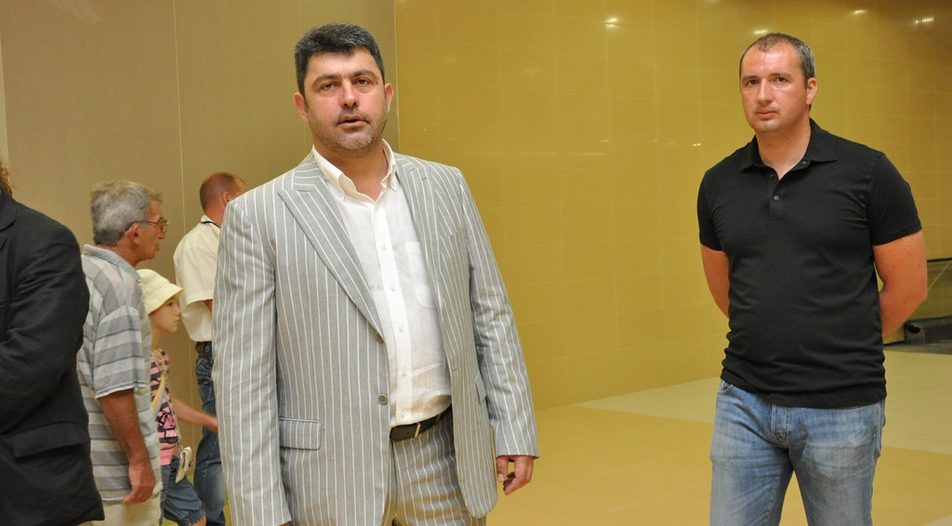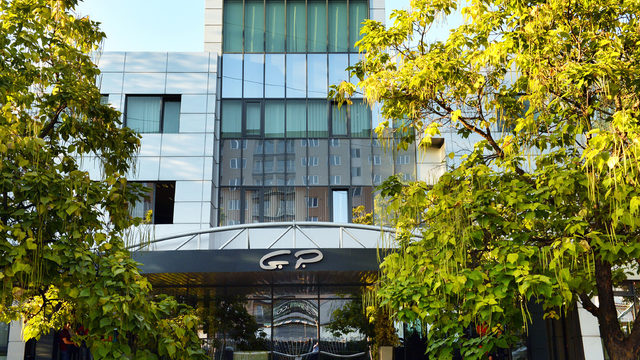About fifty burglaries, about fifty drunken drivers. A total of 147 crimes, more than half of them solved. These statistics in no way suggested that the police in the town of Radomir, in western Bulgaria would make the global news. Or at least not until September 13th, when in a dark field by Egalnitza rail station, police detained two journalists - Dimitar Stoyanov from Bulgarian investigative reporting website Bivol and his colleague Attila Biro from Romanian investigative network Rise Project. The next day, their arrest went global.
Both reporters were apprehended late at night while trying to follow up on a tip. It concerned the burning of documents, which the journalists believed revealed embezzlement of European funds. They had alerted the police about their plan, yet this didn't save them from being handcuffed and led to the nearest police station.
Several days later, the mystery deepened when it emerged that it had an indirect connection to the murder of TV anchor Victoria Marinova in the city of Ruse. In the preview for her last program, Marinova had introduced the two journalists' investigation of the so-called #GPGate. Even the hint of a link triggered an avalanche of foreign media headlines about the murder of a Bulgarian reporter investigating European funds fraud.
How #GPGate started
Bivol's editor-in-chief Atanas Tchobanov said that about a year ago his web site received access to a large stash of data (about 70 gigabytes) on the operations of GP Group, one of Bulgaria's largest construction companies and one that had experienced a meteoric surge in business in recent years. The set of data contained different documents - private and official - that exposed schemes for embezzlement of EU funds. The sorting of the data took several months.
"After we published the article, we started receiving information from different sources," explained Tchobanov. One of them said that original documents were being transported from Sofia to Radomir and destroyed.
"We received information that there were two tons of paper, and not just that - they were burning mobile phones too," recounted Tchobanov, who alerted the prosecutor general and the prime minister in September.
GDBOP, the anti-organized crime general directorate of the interior ministry, contacted the reporters and they had a meeting but the destruction of documents continued. Two days later, believing that police would not intervene, the journalists decided to visit the location revealed by their source. The choice of the venue wasn't random - according to their information, one of the participants in the scheme owned a house nearby. This is how Dimitar Stoyanov, a lawyer friend of his, and Attila Biro, who works with Bivol on different investigations, drove to the outskirts of Egalnitsa. When they reached the pyre, police appeared and arrested them.
The two men were handcuffed back-to-back, but once GDBOP agents arrived on the scene, they were unbound and taken to the police station to write statements. After a Romanian diplomat intervened, they were released. Their arrest warrants stated that they were detained because they had entered a crime scene.
Bivol's #GPGate series triggered one of the very few investigations by the prosecutor's office based on a media report. Nonetheless, it only started after Victoria Marinova's murder. Ms Marinova was robbed and brutally slain on October 6th in Ruse, and the perpetrator was identified and arrested several days later. Because of the link between Ms Marinova's TV program and the work of the two investigative reporters, and because of public suspicions that the authorities were attempting a cover-up, the prosecutor's office was forced to act.
How does the matrix work?
According to the documents initially revealed by Bivol, a group of people would register several consulting companies and start participating in procurement tenders under the Program for Rural Development (PRSR). The amounts of money they'd compete for were insubstantial since the tenders only concerned providing expert opinion in the preparation of costly infrastructure projects.
However, later on, when the evaluation commissions convened to select the winning bidders in the public tenders for projects under PRSR, it turned out that they were staffed with individuals with connections to the consulting companies which had helped prepare the projects. Logically, if the same people both prepare and evaluate a project, they will have good insider knowledge. Still, this is not a crime. However, when links are traced between this network of individuals and the winning bidders, a reasonable suspicion arises about a rigged procedure.
Deputy Prime Minister Tomislav Donchev stated that checks for connected or related individuals in EU projects are constantly conducted by reviewing all public registers (the commercial register, the information system for management and monitoring of EU funds in Bulgaria (UMIS), which contains information about financed projects, beneficiaries, winning bidders, etc.).
"During the process of project selection and allocation of funds, the relevant authorities have the obligation to apply a specific instrument that evaluates the risk of fraud and irregularities - Arachne. The tool was developed by the European Commission and allows for permanent and systematic surveillance of data from EU-wide sources on different projects, their beneficiaries, the particular contracts, and the actual developer," Donchev explained to Capital newspaper.
Obviously, the checks were inadequate. For the ultra-formalistic Bulgarian administration, a connection needs to be legally established. The fact that names, addresses, and bank accounts coincide is insufficient proof.
Where is GP Group?
The companies and individuals that participated as consultants or sat on the evaluation commissions don't have direct connections to GP Group. What connects them is the postal address in Sofia, - 59A, Cherni Vrah Blvd, where the GP Group headquarters is located.
This is also the postal address of two consulting companies owned by Petar Petrov and Tatyana Hadzhieva-Delibasheva - Alfa Build Properties and Energy Consult. According to data from the commercial register, both companies were initially registered at 59A, Cherni Vrah Blvd. Later, their registration address was changed but they kept the old one for their correspondence.
Alfa Build Properties and Energy Consult are only a small link in a larger network of more than 50 companies controlled by Petrov and Delibasheva, or their relatives or acquaintances. Most of these companies are related to tenders won by GP Group.
GP Group was quick to deny a connection, saying it's just a tenant in the building at 59A, Cherni Vrah Blvd. and can't be held responsible for the activities of other tenants.
However, according to Bivol, the owner of the land and the building is the company which acquired the property from Lukoil Bulgaria in 2008. Its contacts are identical to GP Group's. The registrations of both companies were handled by the same attorney - Raycho Boykov Kotov.
The scheme in action
Another example of such connections, Bivol said, is Lilyana Zorteva, who was a member of the commission evaluating the bids for the construction of the third line of the Sofia Metro in 2015. She was a partner in several of Petrov's and Delibasheva's companies. GP Group subsequently won the contract.
Capital newspaper has verified a number of similar examples involving more modest financing than the millions of euro for building the metro. Take Dobri Kondov and Svetoslav Pavlov who were also partners with Petrov and Delibasheva in a number of companies. They were independent experts with the commission that evaluated the bids for contracts for providing thermal insulation solutions for apartment buildings in Pravets municipality in 2015. The contract winners in the different categories were GP Group, Via Construct Group (old name - GP Stroy), and Peter Petrov's Alfa Build Engineering. The contracts had a total value of almost 1.7 million levs.
Kondov and Iveta Atanasova (who is a member of Petrov's Dostoen Pristan association) sat on the Breznik municipality commission, which also awarded thermal insulation contracts in 2015. One of the contracts went to Via Energy Proekt holding company, which includes Via Construct Group, and Delibasheva's EC Energy Proekt.
In May of 2016, Krichim municipality awarded a 91,500 levs contract for the construction of composting facilities to Energy Invest, in which Delibasheva's EC Energy Proekt holds a 99% stake. Dobri Kondov and Anita Dimitrova Kotova were members of the municipal commission evaluating the bids. According to Bivol, Kotova is related to attorney Raycho Kotov, who does a lot of work for GP Group. Kotova and Delibasheva are among the founders of a non-profit organization, A Place Called Home. In 2014, Kondov and Koteva, then members of the municipal evaluation commission in Pravets, awarded to Energy Invest a project to put together an urban layout plan of the town. Delibasheva's company earned 180,000 levs from the contract.
GP Group and Via Construct Group won several other contracts after the tendering authorities were advised by companies forming part of the network described above. The sheer number of such cases suggests they are part of an elaborate scheme rather than a coincidence of names.
About fifty burglaries, about fifty drunken drivers. A total of 147 crimes, more than half of them solved. These statistics in no way suggested that the police in the town of Radomir, in western Bulgaria would make the global news. Or at least not until September 13th, when in a dark field by Egalnitza rail station, police detained two journalists - Dimitar Stoyanov from Bulgarian investigative reporting website Bivol and his colleague Attila Biro from Romanian investigative network Rise Project. The next day, their arrest went global.
Both reporters were apprehended late at night while trying to follow up on a tip. It concerned the burning of documents, which the journalists believed revealed embezzlement of European funds. They had alerted the police about their plan, yet this didn't save them from being handcuffed and led to the nearest police station.













